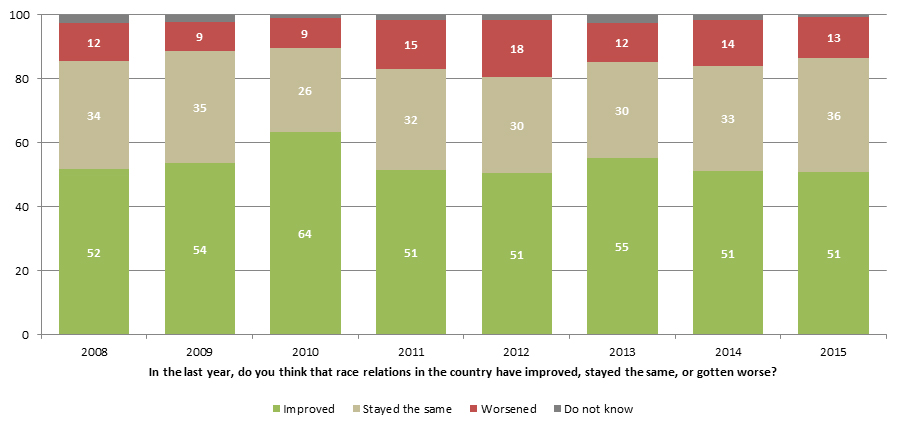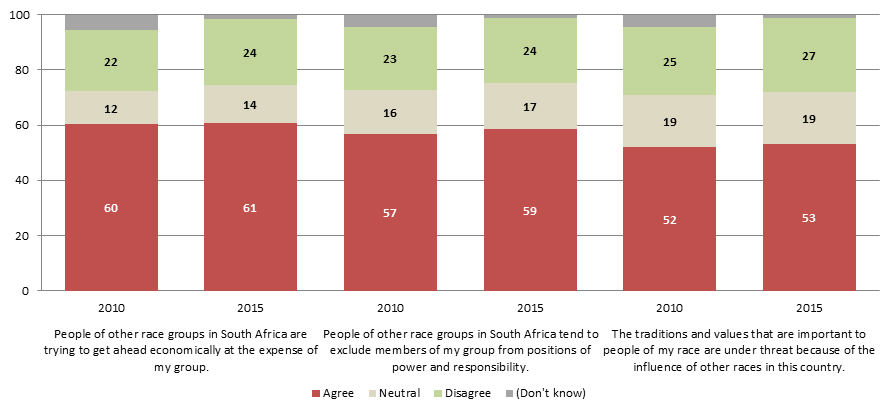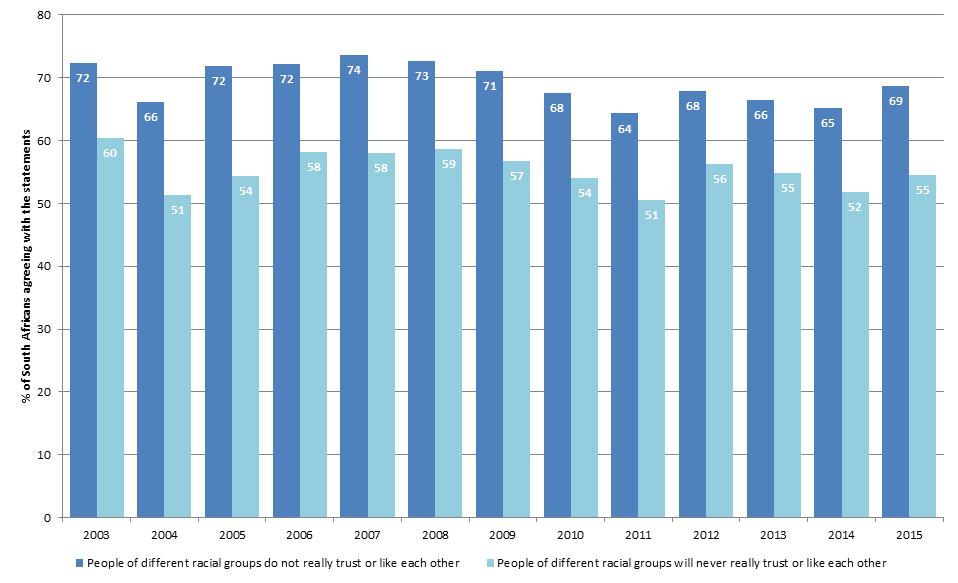There is much unfinished business in post-apartheid South Africa. Over the past year, a series of racist and bigoted outbursts on social media have generated widespread public debate about the state of race relations and social cohesion in the country. Student protests has also drawn attention to economic inequality, the slow pace of transformation in general, and institutionalised racism in society and on university campuses.
Against this backdrop, we consider the trends in attitudes towards race relations over a number of years based on data from the HSRC’s South African Social Attitudes Survey (SASAS) series.
[The HSRC has conducted SASAS on an annual basis since 2003. The survey series consists of nationally representative samples of South African adults aged 16 years and older living in private households. The authors examined SASAS data from recent rounds of the survey series to understand how perceptions of race relations have changed in South Africa. The sample sizes for the 2003 to 2015 surveys range between 2 500 to 3 300 participants.]
The results suggest that there is a general recognition of steadily improving race relations, particularly among black African adults. However, feelings of inter-racial dislike and mistrust persist at consistently high levels. Besides providing a measure of the betterment or worsening of race relations, the data’s value is in the fact that, in giving us a more balanced national picture, it also points to the permeation and breadth of the ‘race relations’ problem.
Contrary to social media sentiment, many in the country feel that race relations have been improving (Fig. 1). In 2015, around half of all South Africans (51%) indicated that they had improved, 36% indicated that they had remained unchanged, and only 13% felt they had deteriorated. These results are similar to what was observed in most rounds of SASAS since 2008. Looking at Figure 3, we can see only the 2010 results stand apart, probably due to the euphoric effect of the FIFA World Cup.
Click on image for larger version

Source: HSRC SASAS 2010, 2015
There is significant optimism amongst black African adults about race relations in South Africa. Less than a tenth of black African adults (7%) felt that race relations in the country had worsened between late 2014 and 2015, while 55% reported improvements and 36% no discernible difference. Black African youth were even more optimistic, with 71% of those aged 16-24 years expressing the view that race relations had improved since the end of apartheid and 56% reporting improvements since 2014.
In contrast to black adults, white and Indian adults were found to be less optimistic about race relations. Two-fifths (40%) of white adults felt race relations had worsened since 2014 and roughly a third (34%) thought race relations had worsened since 1994. Similarly, about a third (32%) of Indian adults believed race relations had worsened between 2014 and 2015, while nearly a third (30%) thought that relations had deteriorated during the post-apartheid period. Among these racial minorities, the youth on average tended to voice more confidence about progress in race relations compared to older generations.
While a measure of improved race relations has emerged, many South Africans express concern that their racial group’s position – economically, politically and culturally – is under threat from other groups (Fig. 2). In 2015, 61% of the population thought that people of other race groups were trying to get ahead economically at the expense of their own group. More than half (59%) thought that people of other race groups were excluding members of their own group from positions of power and responsibility. Finally, almost half (53%) believed that the traditions and values that are important to people of their race group are under threat because of the influence of other races. These figures are not appreciably different from surveys conducted since 2010.

Trust is central to an individual’s ability to form social relationships and reject harmful stereotypes. It is also a commonly used measure of social cohesion. Since 2003 SASAS respondents have been asked their level of agreement with the statement ‘people of different racial groups do not really trust each other’ (see Fig. 3). In 2003 about five-sevenths (72%) agreed with this statement. Public agreement with the statement remained relatively stable until 2007 when levels of agreement began to decline gradually. In 2011, it fell to below two-thirds (64%) of the general public. Since 2011, public agreement with the statement began rising again, reaching 69% of the adult public in late 2015.
Click on image for larger version

Source: HSRC SASAS 2003-2015
In addition, respondents to each round of SASAS since 2003 have been asked to register the extent to which they agree or disagree with the statement ‘people of different racial groups will never really trust each other’. At the time of the first round of interviewing in 2003, three-fifths (60%) of the adult public agreed with this statement. Since 2003, there have been only modest variations, with total agreement ranging between 51 and 60% over the period, and standing at 55% in 2015. This pattern suggests fairly broad-based scepticism about the future of race relations in the country.
The SASAS surveys remind us that there has in fact been an improvement in race relations and that there is room for optimism and hope. But the sobering survey figures also tell us that a considerable proportion of South Africans continue to feel threatened by other race groups. If racial mistrust and dislike are as prevalent, consistent and widespread among South Africans as the data suggests, then we need to begin the conversation with the recognition that this burdens, shapes and constrains everyday interactions in a myriad of difficult and complicated ways (of which social media outbursts are simply a small indication).
As the country prepares to welcome a new Bill on hate speech in an attempt to curb racist language, the SASAS data can perhaps act as a valuable reminder that individualization and criminalization, while necessary at times and for immediate redress, ignore longer and wider trends that are pointing us elsewhere. They point us to the fault lines of social cohesion and nation-building in South Africa. They ask us to use this data as a starting point for seeking deeper understandings between groups about where we are, what it means to be here, and why we are where we are. They challenge us to address the systems, structures and institutions that keep racism and racial inequalities in place.
Benjamin Roberts and Jarè Struwig, SASAS coordinators; Steven Gordon, PhD researcher in the HSRC’s Democracy, Governance and Service Delivery (DGSD) programme; Heidi van Rooyen, Sarah Chiumbu, Molemo Ramphalile and Safiyya Goga are respectively Executive Director, African Research Fellow and PhD researchers in the Human and Social Development (HSD) research programme.
